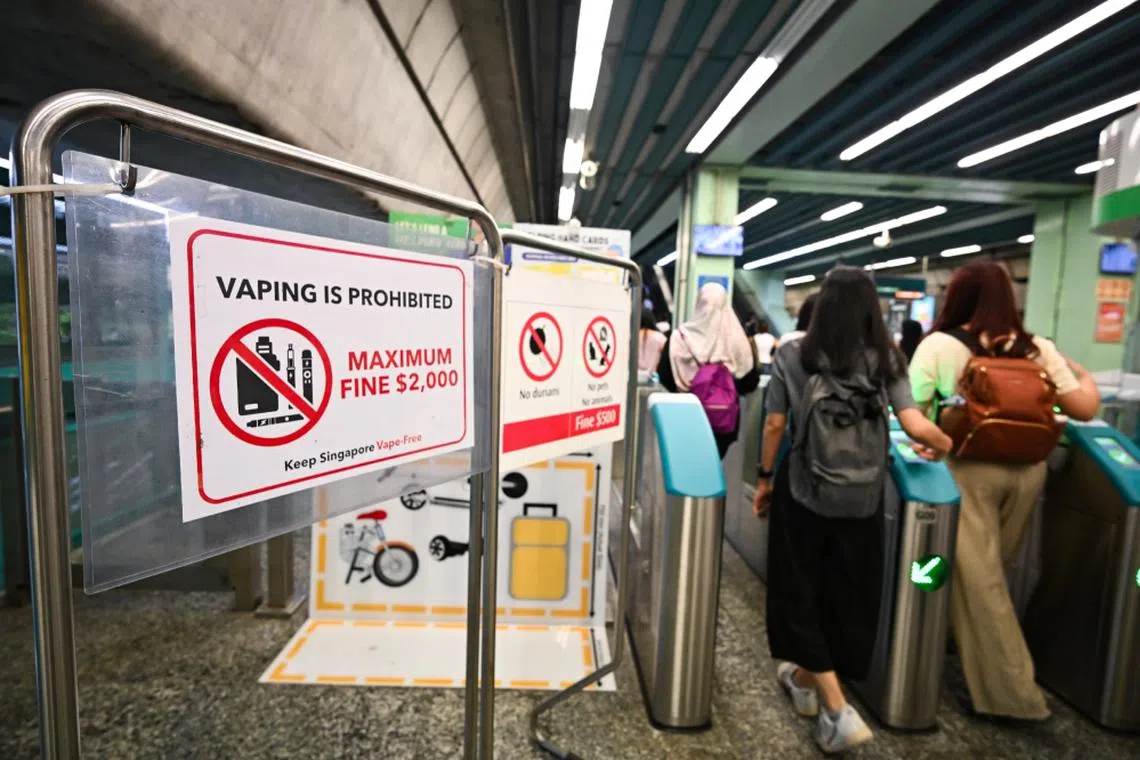Hundreds of officers from police, CNB, MOM, other agencies helping HSA tackle vaping scourge
Sign up now: Get ST's newsletters delivered to your inbox

Other agencies joining the fight against the vaping scourge in Singapore include NEA, NParks and public transport companies.
ST PHOTO: LIM YAOHUI
Follow topic:
- Singapore is intensifying its fight against vaping with more resources and inter-agency collaboration, including seconding officers from other agencies.
- From Sept 1, stricter laws, including the Organised Crime Act, will give agencies more powers to act against vape sellers, smugglers and syndicates.
- Tougher penalties for Kpods (vapes laced with etomidate) mean importers could face up to 20 years in jail and caning.
AI generated
SINGAPORE – Several hundred officers from the police and the Central Narcotics Bureau (CNB) are supporting the Health Sciences Authority (HSA) in its anti-vape operations, which includes targeting syndicates.
The Immigration and Checkpoints Authority has also stepped up enforcement
These numbers show the amount of resources the Government is willing to commit to tackle the vaping scourge in Singapore.
On Aug 28, at a press conference on the Government’s latest vaping measures, Home Affairs Minister K. Shanmugam said: “Officers from other agencies, regardless of which agency, when they find people using vapes, they will be empowered to take action, take enforcement.
“That’s the broad posture.”
Minister of State for Manpower Dinesh Vasu Dash said a small number of some of their 700 empowered officers will be seconded to HSA for this.
Health Minister Ong Ye Kung, who was also at the conference, said other agencies joining the fight include the National Environment Agency, National Parks Board and the Gambling Regulatory Authority, as well as public transport companies.
A spokesman for the Ministry of Defence said it fully supports the Government’s efforts to tackle vaping and has stepped up enforcement checks.
He said the military’s penalty framework is also being stepped up from Sept 1. Penalties range from fines to detention at the detention barracks for personnel caught with vapes or Kpods. Regulars can be discharged from service.
From Sept 1, vaping offences will be scheduled under several laws such as the Organised Crime Act, Online Criminal Harms Act and the Corruption, Drug Trafficking and Other Serious Crimes (Confiscation of Benefits) Act (CDSA).
This will give officers across multiple agencies the powers to take action against vape sellers, smugglers and syndicates, allowing them to also take down vaping content online and confiscate the proceeds from vape sales.
The CDSA has been used against some of the most prolific criminals in Singapore, including those in the $3 billion money laundering case
Currently, etomidate is regulated under the Poisons Act, which allows for a maximum of two years’ jail and a $10,000 fine for possession, use and trafficking.
But from Sept 1 to Feb 28, 2026, etomidate will be listed as a Class C drug
This means importers of Kpods, which are vapes laced with etomidate, could face punishments of up to 20 years’ jail and 15 strokes of the cane.
Sellers and distributors will also see enhanced punishments.

As for Kpod users, first-time offenders will see increased fines of $500 for those below 18, and $700 for adults, with rehabilitation for up to six months.
If they are caught again, they will be arrested and will undergo mandatory supervision for six months.
Abusers who are caught a third time and beyond will be detained at the drug rehabilitation centre (DRC) for 12 months.
Those below 16 will not be admitted to the DRC but will undergo mandatory supervision, including drug testing for 12 months.

Mr Shanmugam said the Ministry of Health will use the time from Sept 1 to Feb 28, 2026, to craft new laws that will give them the right set of powers to tackle not just vaping and etomidate but also other substances that may be abused in such a manner in future.
He said: “They are thinking it through, but it will probably include DRC, mandatory rehabilitation programmes, detention and serious penalties for trafficking.”
CNB said that aside from etomidate, several variants of the substance have been found in vapes in other countries.
These include butomidate, metomidate, trifluoro-etomidate, isopropoxate and propoxate.
All of these will be listed alongside etomidate under the MDA.
Current fines for vaping are typically $300 for those below 18, and $500 for adults, with a maximum of $2,000 if they are prosecuted in court under the Tobacco (Control of Advertisements and Sale) Act.
But the enhanced penalties will see offenders facing increased fines of $500 for those below 18 and $700 for adults.
Second-time offenders will have to attend rehabilitation for three months, while those caught a third time and beyond will face prosecution and the maximum $2,000 fine.
Mr Ong said the framework to tackle vaping will be refined in the six months before the introduction of new laws.
Explaining why this might take some time, Mr Ong said vapes have changed the landscape regarding substance abuse.
He said that unhealthy habits like smoking cigarettes and substance abuse were two distinct behaviours previously.
However, vaping has blurred those lines, with vaping being a delivery device that is a gateway for very serious abuse of substances like etomidate.
He said: “This change in landscape means we have to adapt our current approach to substance abuse.
“(The laws) are currently not set up for this model of operation. We need a fit-for-purpose law to adapt to this new landscape.”



